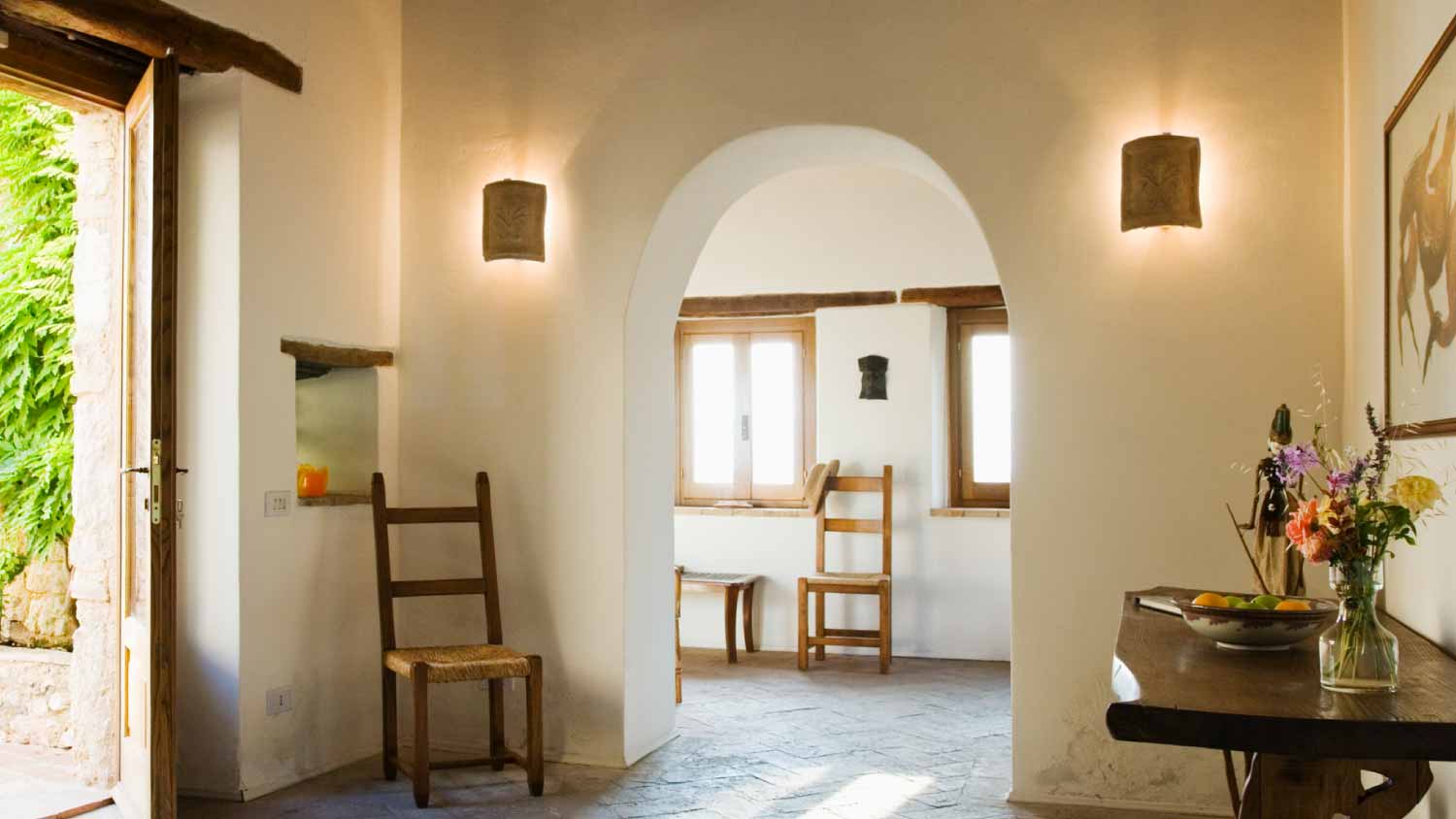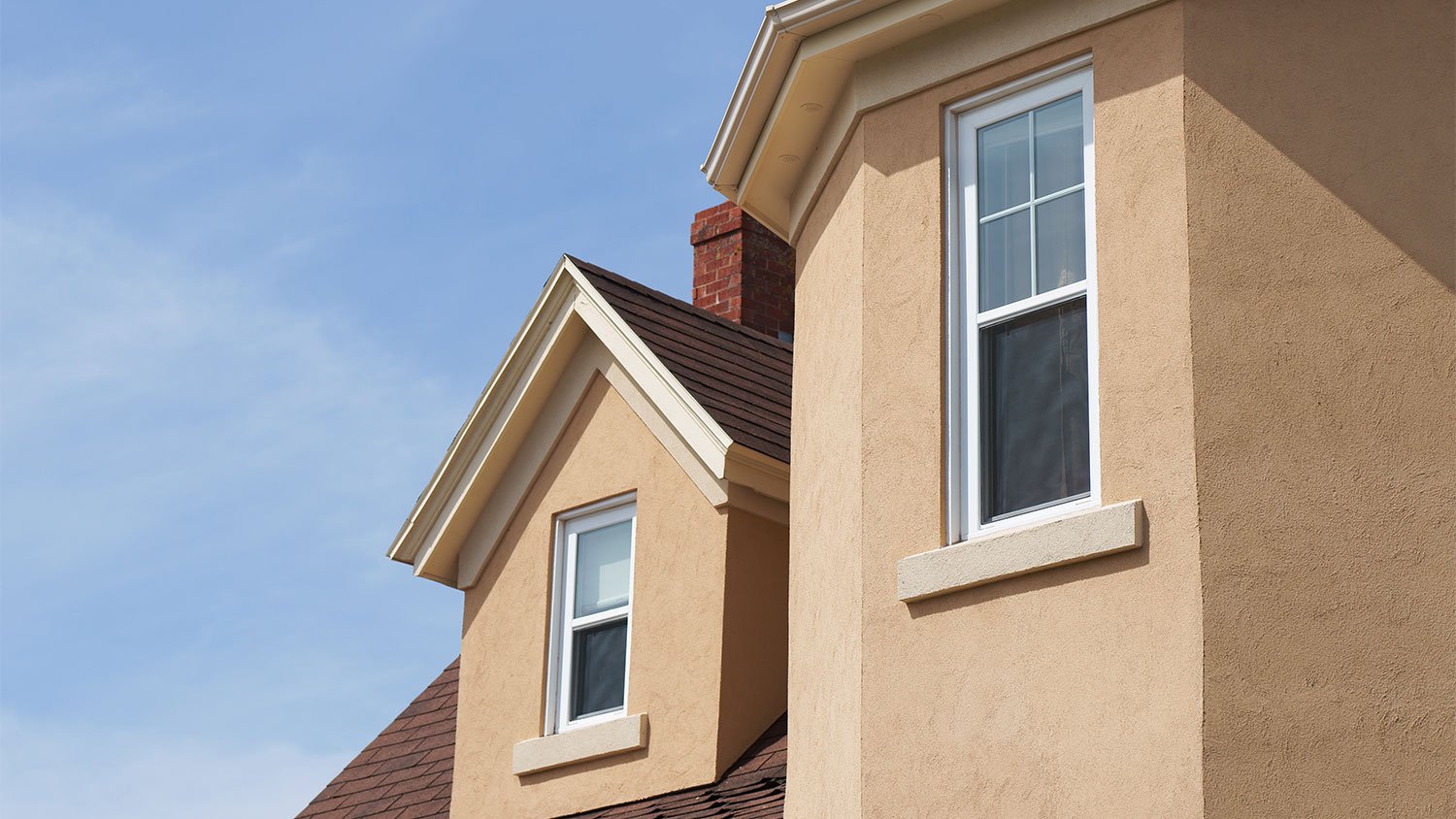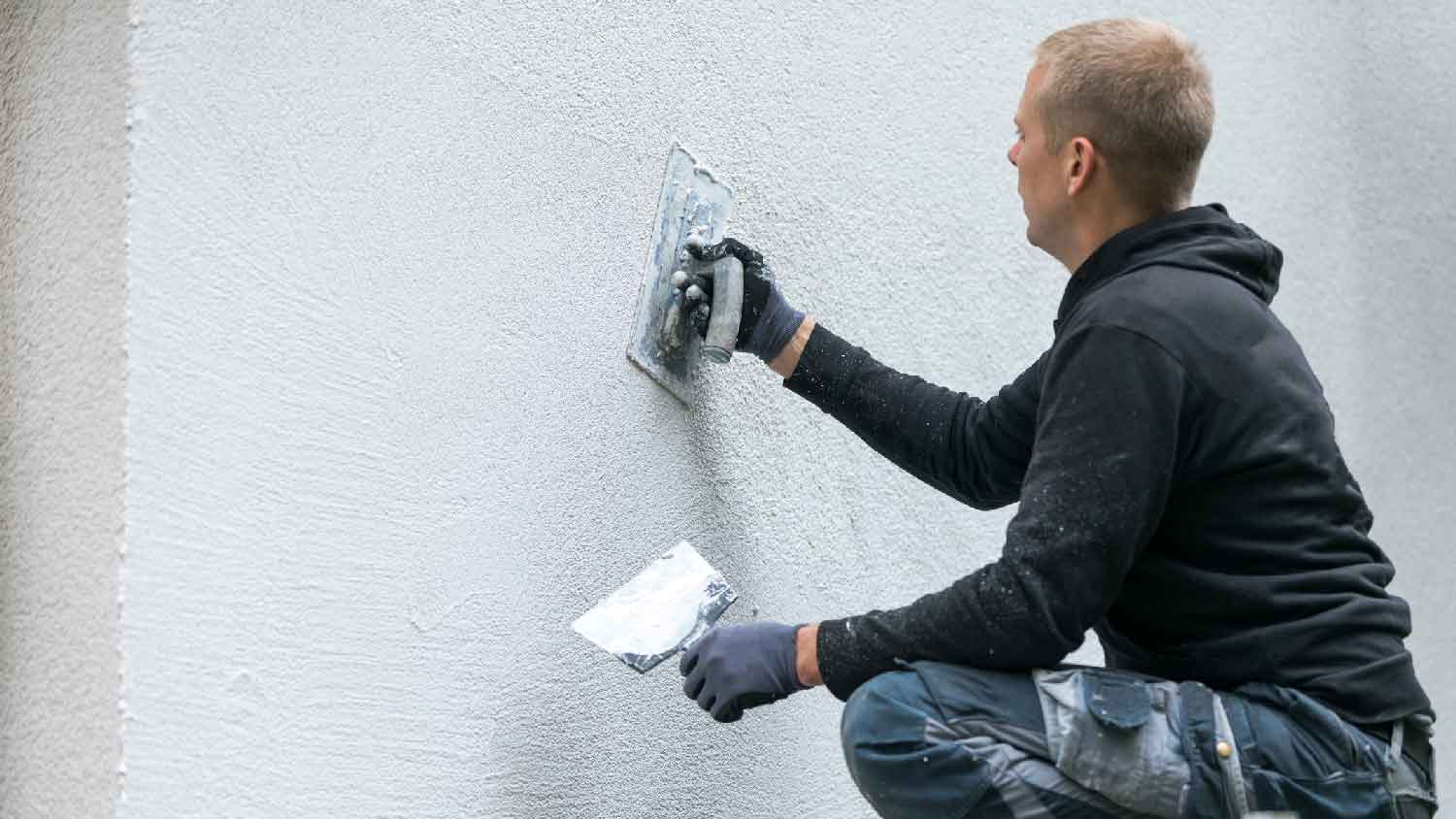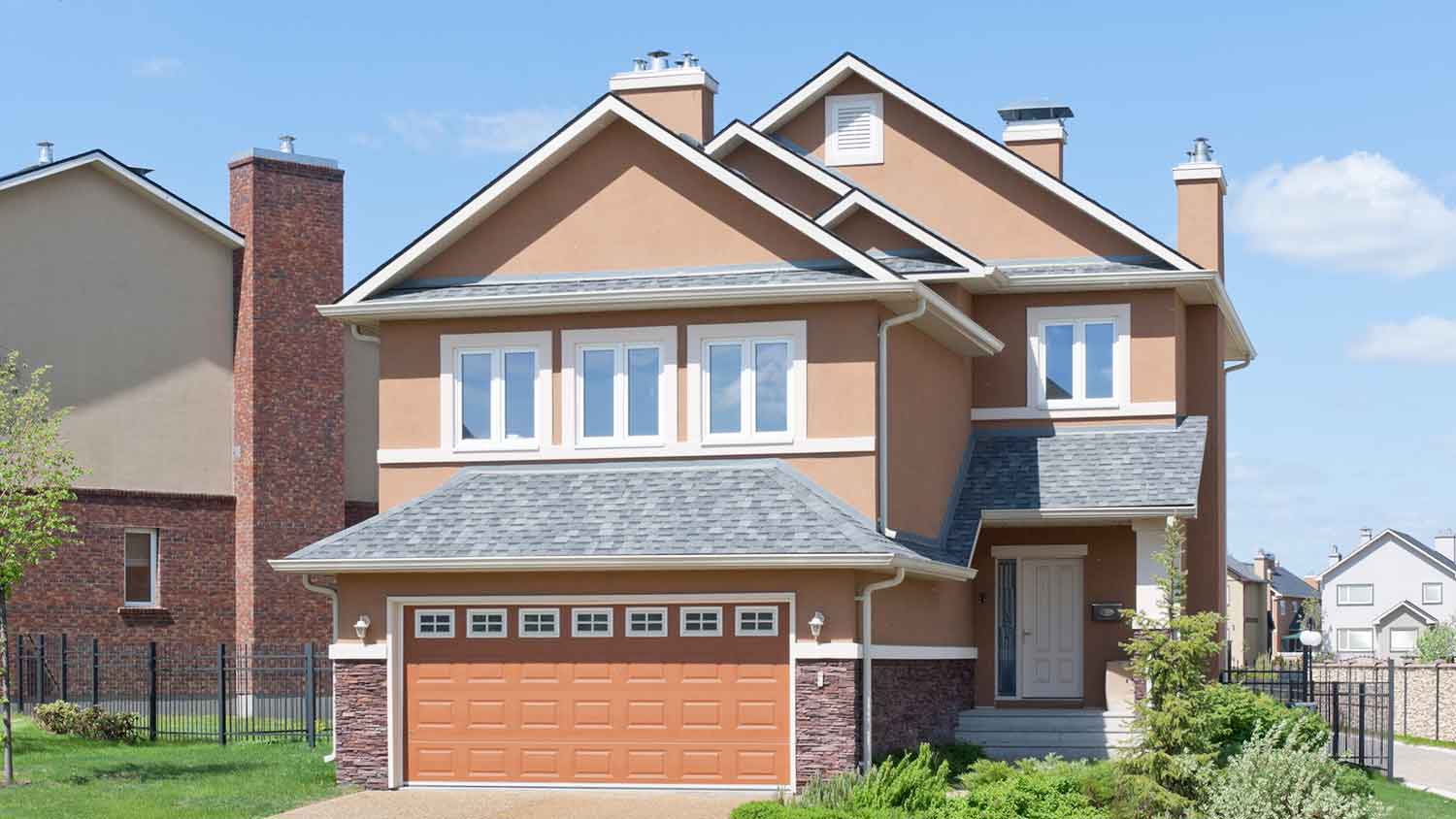
Get transparent stucco inspection cost info. Learn what impacts price, how to save, and what to expect before hiring a pro for your stucco inspection.
Stick to these questions to find the best stucco contractor


Stucco contractors can help to create or preserve beautiful structures by applying interior and exterior stucco, plaster, and cement. If you currently have damaged stucco at your home, they can also handle inspections and remediation. Due to the complexity and fragility of stucco, hiring a stucco pro can be more complicated than hiring a general handyman. This overview of questions to ask a stucco contractor is a great place to start.
When you hire an experienced professional stucco contractor, you can be confident they have access to the best materials and understand how to properly prep the surface and apply the stucco in order to avoid bubbling, extensive cracking, and other problems. While stucco has a reputation for being durable and beautiful, these qualities only apply when stucco is installed properly. The integrity of a finished project comes down to the skill used during installation. Stucco failure caused by poor installation practices can result in:
Moisture and water damage
Leaking inside your home
Rotting
Water stains
Efflorescence (white salt deposits)
Cracking
Bubbling stucco (delamination)
In addition to taking away from your home's aesthetic, faulty stucco installation can pose health and safety risks. For example, improper flashing installation can prevent water from draining out from behind your stucco. This can result in excessive moisture that damages wood framing while also posing risks for toxic mold. If improper stucco installation leads to bubbling stucco, this can cause delaminated stucco to fall to the ground, potentially injuring people and animals.
Here’s a closer look at the benefits an experienced professional stucco contractor near you can bring to the table.
Professional stucco contractors use their experience to help clients select the right stucco for the job. In addition to making recommendations based on your local climate and durability needs, they can also help you to match the historic or modern aesthetic of your property. Additionally, stucco contractors know how to utilize the best installation techniques for each job while adhering to all manufacturer and industry standards. Of course, professional stucco contractors can also answer all of your questions about stucco pros and cons if you're deciding between stucco vs. brick or other options.
Stucco contractors are familiar with different brands and suppliers. They can often source products that aren't available to the general public. What's more, their relationships with suppliers and brands often allow them to get the best rates. A contractor can source materials for you based on your desire for synthetic stucco vs traditional stucco.
From preparation to the final inspection, high-quality stucco contractors handle every step impeccably. When you hire a pro, you can be sure that proper surface preparation is being performed to ensure that the new stucco will adhere properly for the best performance over time. High-quality contractors can also address or remediate any existing cracks, bubbling, or mold before applying a new stucco layer.
Here are some essential questions to ask a stucco contractor when planning your project:
What is your experience with stucco installation and repairs?
Can you provide references or examples of previous stucco projects you've completed?
What types of stucco do you recommend for my home's exterior/interior, and why?
How do you handle surface preparation and potential pre-existing issues like cracks, mold, or water damage?
What techniques and materials will you use for my project, and how do they ensure durability and performance?
Are you licensed and insured to perform stucco work in this state?
What is the estimated timeline for completion, and how will weather conditions impact the project schedule?
How do you ensure quality control throughout the project, from preparation to the final inspection?

Yes, stucco installation can potentially be a DIY project for the ambitious homeowner. However, anyone who is serious about taking on this project must be warned that applying stucco is a time-consuming process that will require you to go through the steps of building up several layers of stucco after establishing a base layer. Let's just say that there's a reason stucco work has been left to artisans and craftsmen for the thousands of years that it's been used!
The basic steps of stucco installation include applying a bonding agent, applying a scratch coat, applying a brown coat, and applying a finish coat. However, techniques and application complexity can vary based on whether you are applying stucco over wood, brick, or concrete. If any portion of your prep work or installation is incorrect, the result could be water damage, mold, or failed stucco.
The answer depends on the qualifications of the person you're hiring. Generally, a handyman doesn't have the training, experience, or certification to perform the job with the skill level necessary to ensure you won't be stuck with failed stucco down the line. In some states, a person needs either a special stucco/plastering license or general contractor license in order to do stucco work.
Yes, some painting companies are also licensed stucco contractors. Be sure to ask about stucco qualifications when requesting a quote. It's also important to ask how frequently a painting company performs stucco work. If you're looking for someone to paint stucco, make sure you consider the pros and cons of painting stucco before making a decision.
Stucco work is performed differently based on whether a contractor is applying stucco to a home's interior or exterior. Additionally, the specifics of your home and your choice of finish will impact the process. That's why one of the top questions to ask a stucco contractor is about the technique they use. Here's a general rundown of what residential stucco application looks like:
Surface preparation: This includes cleaning and drying the surface before inspecting for imperfections or cracks that need to be repaired.
Applying wire mesh/lath: As part of the prep process, wire mesh or lath will be fastened to the surface.
Stucco mixing: Each stucco batch must be mixed by hand to ensure consistency.
Scratch coat application: A coat with 3/8-inch thickness is applied as a base layer.
Final coats: Next comes a period of application, leveling, and drying involving multiple coats. The finish coat is the final stucco that will be visible.
From average costs to expert advice, get all the answers you need to get your job done.

Get transparent stucco inspection cost info. Learn what impacts price, how to save, and what to expect before hiring a pro for your stucco inspection.

Discover the cost to stucco a house in 2025, including average prices, key factors, and tips to help you budget and plan your stucco project with confidence.

Discover the average stucco repair cost, key price factors, and ways to save. Get expert tips to budget your stucco repair project with confidence.

If your home's stucco is cracking or deteriorating, it's important to fix the issue right away to avoid structural damage or mold. Here's who to call for stucco repair.

EIFS stucco is a common alternative to traditional stucco, but it comes with some drawbacks. Learn about six EIFS problems and how to solve them.

Stucco siding is a fantastic siding material that can last for 50 years. Learn tips on maintaining stucco siding to keep it looking great.